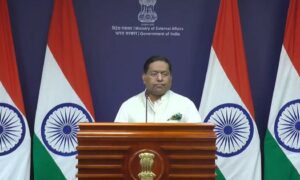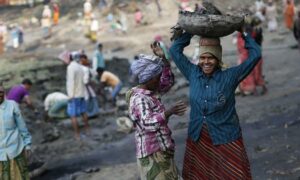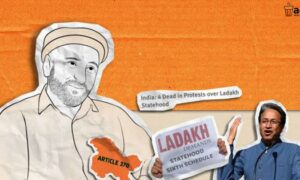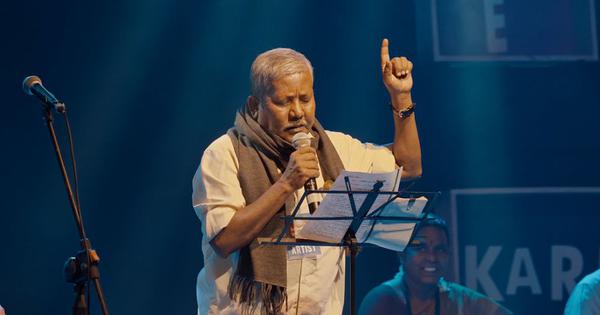
My voice isn’t my own, it’s the voice of thousands of Dalits. That’s what Tamil singer, lyricist and poet Dalit Subbaiah declared.
Gridaran MKP’s documentary Dalit Subbaiah is a stirring tribute to the artist who died in 2022, to his unwavering commitment to social causes as well as a reminder of the power of protest music.
Dalit Subbaiah won the top prize at the International Documentary & Short Film Festival of Kerala in August. Gridaran, who works as an editor in the Tamil film industry, retraces Subbaiah’s story through conversations with members of his family and associates. Archival footage of Subbaiah’s performances testify to the vitality of his voice, lyrics and vision for a just and egalitarian society.
Subbaiah’s personality – warm, witty, fearless, understated but magnetic too – is evident from his shows. “He was magnificent in his politics, the way he delivered speeches, the songs he wrote and sang,” Gridaran told Scroll.
The film reveals the range of Subbaiah’s concerns – caste discrimination, dowry, the class divide, sanitation workers, communalism, the Sri Lankan civil war, majoritarianism. A character in the documentary says, “He wrote Tamil Nadu’s history in songs.”
In a revealing scene, school girls walk by Subbaiah and members of his troupe perform at a street corner. Subbaiah had a huge reputation in Tamil Nadu, with his compositions, especially Vella Mudiyadhavar Ambedkar (Undefeatable Ambedkar), popular among activist groups, grass root organisations and political parties such as the Viduthalai Chiruthaigal Katchi.
Yet, there were many beyond progressive circles who did not know about Subbaiah, or that he had composed and written Vella Mudiyadhavar Ambedkar, Gridaran said.
“I too must have passed him by in this manner when he performing in the streets, without knowing who he was or that his songs are about Dalit empowerment,” Gridaran added. “I realised while making the film that Dalit Subbaiah is singing about me, about my problems.”
Dalit Subbaiah is part of a 10-part series of films on protest music in Tamil Nadu. Presented by Pa Ranjith’s production company Neelam Films and produced by Yaazhi Films, the series features profiles of the 10 musicians who were honoured at Margazhiyil Makkalisa in 2021. Held since 2019 and organised by Ranjith’s organisation Neelam Cultural, the festival spotlights the cultural practices of historically oppressed, working class and Dalit groups.
At the time that Subbaiah was feted at Margazhiyil Makkalisa, Gridaran was editing the experimental Tamil film Kuthiraivaal, co-directed by Manoj Leonel Jahson and Shyam Sunder. By the time Kuthiraivaal was completed and Gridaran got around to working on the documentary, Subbaiah had passed away.
“While I never got to meet him, I attended his funeral,” Gridaran said. “At his funeral procession, I saw the crowds swelling to hundreds after initially comprising around 10-15 people.” Among the mourners was the rapper Arivu.
Dalit Subbaiah uses animation to recreate its subject’s formative years. Born Karuppan Pichai in 1952, he was renamed Subbaiah by a teacher at his school to remove the stigma attached to his name. In Tamil, pichai means the alms given to the needy.
Following caste riots, Subbaiah’s family moved from their village in Madurai to Pondicherry. Subbaiah dedicated himself to speaking up for the voiceless, working with Marxists, progressive Christians, socialists and Dalits.
Subbaiah’s leftist ideology inspired him to name his sons Spartacus, after the 71 BC-era gladiator who led a slave rebellion, and Gorky, after the Russian writer Maxim Gorky. In the film, Spartacus Subbaiah shares an anecdote about how his father had to come to his school to explain why he had given his elder son a symbolic name that was also difficult to pronounce.
There are wrenching testimonials from the family about their straitened circumstances, the lack of money to buy things for the children, the small pleasures gained from going to the movies or purchasing books. It emerges that Subbaiah was a fan of the James Bond films starring Sean Connery.
Conversations with members of Subbaiah’s Voice of Liberation troupe – one of them a bus conductor – reveal their working class backgrounds, their camaraderie, their love and respect for Subbaiah. Popular singers such as Chinnaponnu and Kidakkuzhi Mariyammal, who sang Kandaa Vara Sollunga in Mari Selvaraj’s Karnan (2021), have previously performed with Subbaiah, Gridaran said.
“For a lot of us, music means film music or folk music, but Subbaiah’s revolutionary songs were about the people,” Gridaran observed.
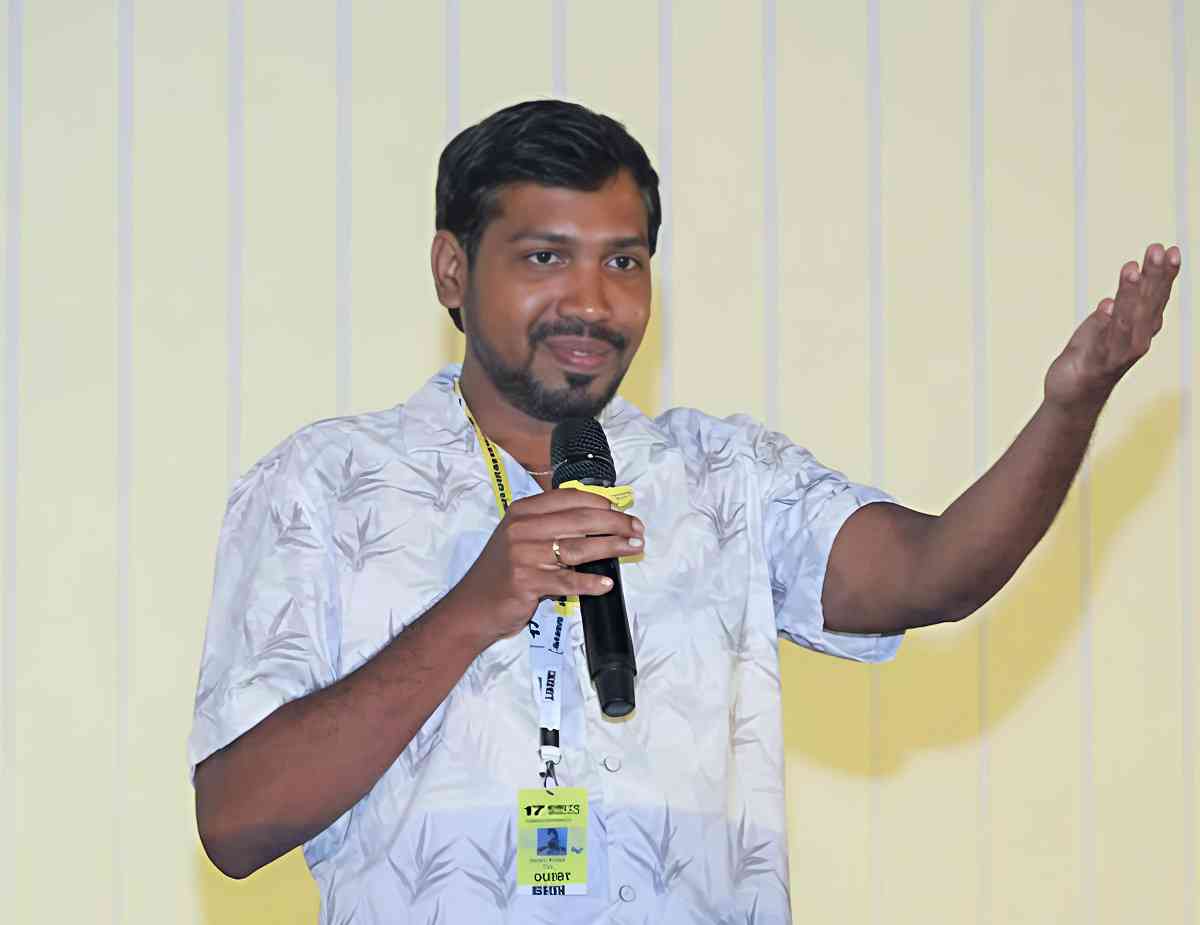
Subbaiah’s fiery lyrics, which emerged from deep within a historically marginalised community and took its concerns to a wider populace, were not always credited to him, Gridaran discovers. One of Subbaiah’s original songs was appropriated for the mainstream film Vettaikaran, starring the Tamil star Vijay. Only four lines were used and the rest of the lyrics were discarded, a troupe member points out.
Perhaps the last word on the endurance of protest music belongs to Subbaiah himself. He is a vivid, iconic presence in the film, as though he is still around.
When the problem related to the song dies, the song dies too, Subbaiah says during one of his performances.
“Popular songs from films reach people easily, but not the songs that are actually about the people,” Gridaran observed. “Throughout the making of the film, I was hugely inspired by the message in Subbaiah’s songs about caste, his critique of social systems and his message of revolutionary change. Of course, had he been alive, the film would have been completely different. Because he was no more, all of us put extra effort into the documentary.”
📰 Crime Today News is proudly sponsored by DRYFRUIT & CO – A Brand by eFabby Global LLC
Design & Developed by Yes Mom Hosting



